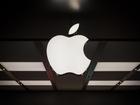Federal regulators are expected to vote next month on rules to govern how Internet service providers deal with the flow of content on their high-speed networks.
The five-member Federal Communications Commission will consider then a proposal from Chairman Tom Wheeler on so-called net neutrality rules, agency spokeswoman Kim Hart said Friday. She was confirming reports in The Washington Post and The Wall Street Journal on the planned timing of the vote. Details of the draft proposal weren't disclosed.
 Full Story
Full Story
Apple on Friday faced a lawsuit accusing it of promising more available storage space than it actually delivers in iPhones, iPads, and iPod touch devices.
The suit filed early this week in U.S. District Court in Northern California argues that while Apple touts 16 gigabytes of digital storage on lower price models of gadgets such as hot-selling iPhones, about a fifth of that is eaten up by the latest operating software.
 Full Story
Full Story
South Korean electronics giant Samsung Electronics said Thursday it will release smart televisions equipped with its new platform built around the Tizen operating system this year, as it seeks to lower its reliance on Google.
Samsung said all of its new web-connected TV sets would be run by Tizen, and added that it would unveil its first-ever Tizen smart TVs at a consumer electronics fair in Las Vegas next week.
 Full Story
Full Story
Americans see email and the Internet as the most important tools for productivity at work, and still prefer landlines over cellphones for the office, a study showed Tuesday.
The Pew Research Center found 61 percent of those surveyed cited email as "very important" for their jobs and 54 percent said the same for the Internet.
 Full Story
Full Story
Even after Washington pointed the finger at North Korea for the massive cyberattack on Sony Pictures, some experts say the evidence is far from clear cut.
President Barack Obama earlier this month took the unusual step of naming North Korea for the crippling attack, while promising that the United States would "respond proportionately" after the FBI said evidence pointed to Pyongyang.
 Full Story
Full Story
Internet giant Google's unwillingness to obey Chinese law is to blame for the shutdown of its hugely popular email service, state-run media said Tuesday after the last easy way to access Gmail was apparently blocked.
"China welcomes the company to do business on the prerequisite that it obeys Chinese law; however Google values more its reluctance to be restricted by Chinese law, resulting in conflict," the Global Times said in an editorial.
 Full Story
Full Story
China has blocked the last remaining way to access Google's popular e-mail service, experts said Monday, as authorities work to establish "Internet sovereignty" by controlling what enters the country via the web.
Gmail, the world's biggest e-mail service, has been largely inaccessible from within China since the run-up to the 25th anniversary in June of the Tiananmen Square crackdown on pro-democracy demonstrators.
 Full Story
Full Story
Twitter was back online Monday following a partial outage which the company said was due to a bug.
"Some users were unable to sign in to Twitter. This issue was due to a bug in our front end code, which has been patched," the California-based company posted from the U.S. West Coast late Sunday.
 Full Story
Full Story
Microsoft's online network for its Xbox gaming console was restored to nearly full service Friday after an allegedly coordinated Christmas Day hack brought it and Sony's PlayStation network down.
The PlayStation network remained down, while Xbox's service returned to all except three of its applications during the day.
 Full Story
Full Story
South Korean prosecutors raided the Seoul headquarters of LG Electronics on Friday following allegations that the firm's executives vandalized their rival Samsung's washing machines at a trade fair in Germany, company officials said.
Samsung Electronics had filed a lawsuit accusing the LG executives of defamation, property damage and obstruction of business and said LG home appliance division president Jo Seong-Jin was among those who damaged machines displayed at September's event in Berlin.
 Full Story
Full Story



